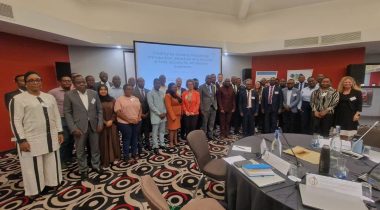
Mark Bou Mansour ■ GRI invites feedback on its first global tax transparency standard

A new draft Standard on tax and payments to governments was published today by the GRI, the global standard setter for sustainability reporting. This is the first global standard designed to help organisations understand and communicate the impact of their tax strategies on the economies and societies they operate in using country by country reporting techniques. The GRI, whose Sustainability Reporting Standards are currently used voluntarily by over 4,000 organizations in over 90 countries, is now inviting public comment on the draft GRI Standard.
The draft Standard was developed by an expert, multi-stakeholder Technical Committee which included Alex Cobham, our chief executive. The Technical Committee was setup in 2017 with the task of making tax reporting more transparent and accessible in response to organisations’ tax affairs facing increasing scrutiny from stakeholders, tax authorities and citizens.
Tax and related payments to governments are the fundamental source of revenues, and consequently, a vital means to finance sustainable human development. The integration of national economies and markets in recent years has placed international tax rules under greater strain. Recent tax related scandals like LuxLeaks and the Panama Papers have prompted stakeholders to ask for greater and more transparent corporate reporting on tax and other payments to governments.
Tax transparency promotes trust and credibility in the taxation system and in the tax practices of organisations. It enables stakeholders to make informed judgments about whether an organisation’s position on tax and payments to governments is acceptable and informs public debate. Equal access to quality information also contributes to better-informed public debate on tax policy.
Since 1997, GRI Standards have become the world’s most widely adopted global standards for sustainability reporting. According to the GRI website, 93 per cent of the world’s largest 250 corporations now report on their sustainability performance. By helping organisations communicate their impact on climate change, human rights, governance and social well-being, GRI Standards have enabled real action to create social, environmental and economic benefits for people across the world.
The inclusion of country by country reporting in the new draft Standard on tax and payments to governments marks another milestone for tax transparency. Country by country reporting requires multinational corporations to provide a jurisdiction-level breakdown of activities, profits declared and tax paid. The practice clarifies where corporations are conducing real business activity and where they are reporting their profits, making it easy to identify risks of profit shifting for tax avoidance – and to identify the jurisdictions that are attracting profit shifting at the expense of other countries.
The first draft international accounting standard for country by country reporting was created for the Tax Justice Network in 2003 by Richard Murphy, an accountant who is also a member of GRI’s Technical Committee. The approach was initially written off as unrealistic, and a version for the extractive sector was blocked by the Big Four accounting firms at the International Accounting Standards Board in 2006 despite the support of investor and philanthropist George Soros and Publish What You Pay, a global coalition. Today though, there are a number of standards for country by country reporting including for financial institutions in the EU, and for reporting to tax authorities for all large multinationals under the OECD’s Base Erosion and Profit Shifting (BEPS) Action Plan. The new draft GRI Standard will not only help catapult the practice to thousands of organisations across the world, it sets out by far the most robust implementation of the practice.
There are three main ways in the GRI’s draft Standard’s approach to country by country reporting is superior to the OECD’s approach.
First, under the draft GRI draft Standard, organisations publicly share their country by country reporting data. Country by country reporting data currently collected by tax authorities under OECD rules is kept private. Making country by country reporting data public contributes to better-informed public debate on tax policy and serves as a strong deterrent against corporate tax dodging.
Second, the draft GRI Standard distinguishes between intra-group sales (which occur between a multinational corporation’s branches) and unrelated party sales. This distinction is crucial to separating real economic activity from purely accounting transactions.
Third, the draft GRI Standard requires reporting companies to either use audited financial statements or financial information filed on public record, or to reconcile the reported information with the data stated in these. Where numbers do not reconcile, companies can explain. This avoids a situation where public country by country data simply cannot be reconciled with published financial information which would otherwise undermine trust in all of a company’s reporting. The draft Standard’s distinction between intra-group sales and unrelated party sales is crucial to reconciling this information.
The draft GRI Standard will be open for public comment for 90 days, until 15 March 2019. GRI will offer free webinars during the public comment period, where stakeholders can learn more about what’s included in the draft Standard.
Sharing your feedback will help the GRI make tax reporting more transparent and accessible to a wider range of stakeholders. Make sure you have your say on whether the draft Standard is clear and feasible to report on, and if it will deliver the valuable information you need to make sound assessments about an organization’s tax approach. Input from investors and asset managers would be of particular value.
The draft Standard is available as an interactive PDF here. You can register and provide your feedback by downloading the PDF and completing the forms. Please submit the PDF with your completed feedback before 15 March 2019. You can learn more about the GRI Standard on tax and payments to governments here. In the December edition of the GRI podcast to hear directly from Technical Committee members, including Rob Wilson of investor MFS and our chief executive Alex Cobham, about why the need for increased tax transparency is so urgent, and the value the Standard offer.
Related articles
One-page policy briefs: ABC policy reforms and human rights in the UN tax convention

Bad Medicine: A Clear Prescription = tax transparency

The Financial Secrecy Index, a cherished tool for policy research across the globe

Lessons from Australia: Let the sunshine in!

Strengthening Africa’s tax governance: reflections on the Lusaka country by country reporting workshop

Do it like a tax haven: deny 24,000 children an education to send 2 to school
The State of Tax Justice 2024

Indicator deep dive: Public country by country reporting

New Tax Justice Network podcast website launched!


